-
Careers
Our job offersjobs, internships and apprenticeships
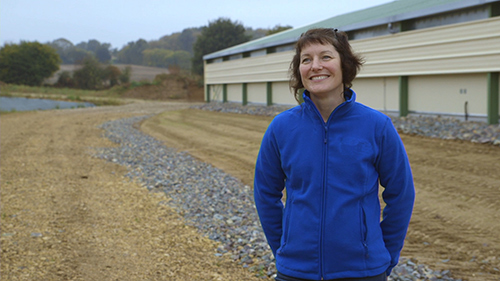
What are the benefits of joining LDC as a farmer?
Are you interested? Write to us with a detailed description of your farming project (starting out, take-over, change of profession…), your hopes and desires (species, farming method) and your contact details (geographic sector, telephone number…), and we’ll get in touch with you soon.
By clicking here:
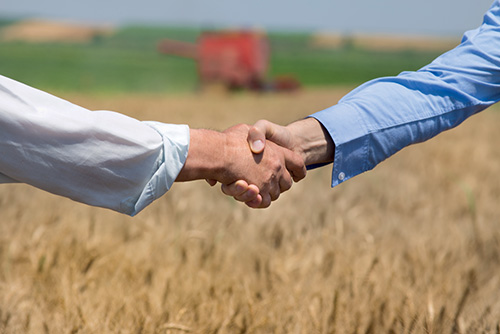
For more than 50 years we have enjoyed special relationships and close partnerships with all our farmer partners to support sustainable farming. The relationship is balanced and fair:
The Group helps preserve local industries by favouring the national origin of raw materials and meats for its poultry and processed products.
The Group has historically relied on processes under official quality signs (Label Rouge, AOP – Protected Designation of Origin, Organic) for free-range poultry. Since 2017, the Nature d’Éleveurs contract has provided an ethical basis for the sustainable farming of both certified poultry and everyday poultry.
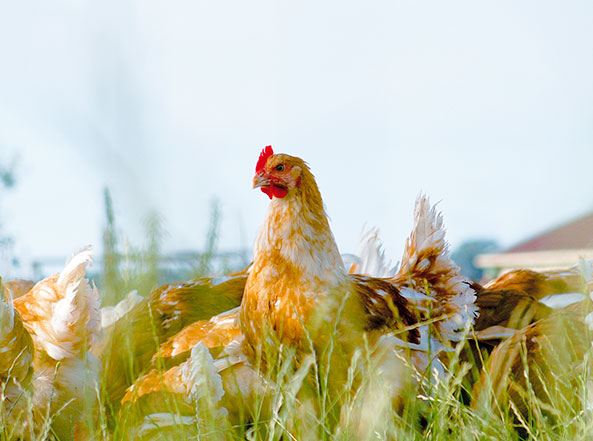
In France, the Group has been predominantly developing sustainable farming processes through the following programs:
89% of French farms are already committed to these sustainable farming programs. Our objective: 100% by 2025. All the partners in the Group’s supply chains (hatcheries, feed manufacturers, farmers, production organisations, slaughterhouses, etc.) are committed to implementing controlled practices that go beyond compliance with the strictest regulations in order to better meet the expectations of consumers, farmers and citizens, the needs of animals and environmental issues.
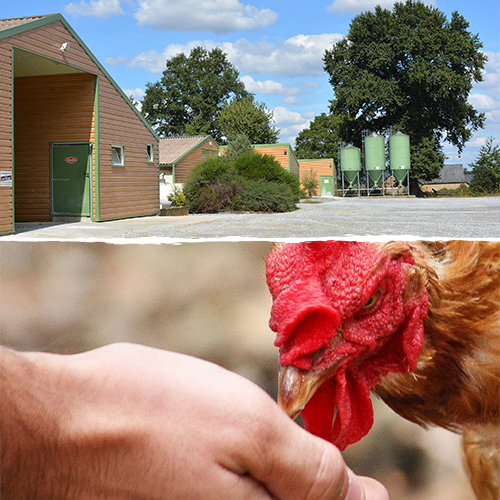
This is demonstrated through many measures, which vary depending on the program in questions:
In terms of transport and slaughter, we promote animal protection through:
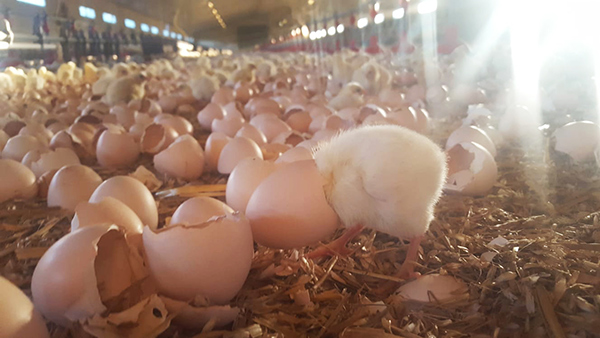
In addition to the implementation of these recognised sustainable farming practices, we innovate with our upstream partners each day to promote animal welfare. Here are a few examples of recent progress:
Within the International division, the Group is also developing farming methods inspired by its expertise in traditional poultry free-range farming and certified poultry or by compliance with the most demanding specifications requested by its customers in Europe.
The LDC Group is recognised for taking animal welfare into consideration and for its dialogue with NGOs. It is classified on level 3 out of 6 in the Business Benchmark on Farm Animal Welfare (BBFAW).
Policies are defined within the LDC Group to provide a framework for all these practices: provision of sustainable animal feed, animal welfare, environment… Here is our animal welfare policy which drives our progress each year.
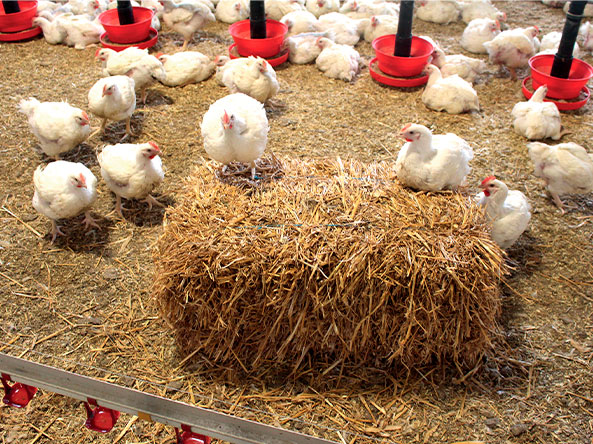
Launched in 2017 by the LDC Group, the Nature d’Eleveurs en Terres de France program is a progress contract that complements the official quality sign programs with a view to promoting the know-how of its French poultry farmers using hen house rearing techniques. Its aim is guarantee high quality products at an affordable prices, promote animal well-being and health and protect the environment and secure farmers’ incomes within the framework of a controlled, transparent supply chain.
Above and beyond strict regulatory requirements, Nature d’Éleveurs is engaged in a continuous improvement process and commits all partner farmers and the sector:
– to the introduction of comfortable hen houses that promote the expression of the animals’ natural behaviours: natural light, 10% increase in available space, perches and peckable substrate, air and bedding quality,
– to ensuring animal health: strict hygiene measures to guarantee health security, the development of natural solutions and alternatives to antibiotics and any treatments to be administered under the exclusive guidance of the farmers’ vets,
– to providing feed produced in France close to the farms, made to satisfy animals’ nutritional requirements, composed of 100% plants, minerals and vitamins using 100% French wholegrain cereals,
– to integrating farms into their surrounding landscape, to conserving water and energy resources and to waste recycling.
All of the requirements are controlled for each party involved (farmer, feed producer, group…) by the producer groups’ quality teams and by an independent control body.
Nature d’Eleveurs is a voluntary program that engages the hen house farming sector at 360° on all the challenges of sustainable development. Nature d’Eleveurs acts to respond in a balanced way to the expectations of customers and consumers, farmers and society. The program is rolled out across the various sectors and applies to all species: hens, chickens, turkeys, guinea fowl, ducks, rabbits…
The LDC Group has fixed itself the objective of deploying Nature d’Eleveurs en Terres de France with all its farms that are not already involved in Organic, AOP (Protected Designation of Origin), Label Rouge or free-range programs by 2025 so that by this date 100% of partner farms will be referenced in a sustainable, controlled farming program.
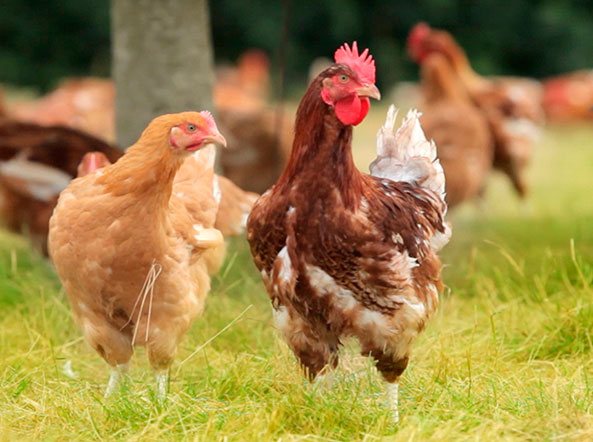
The French AB (organic) logo (official quality sign), displayed on organic eggs and poultry, guarantees production methods that comply with organic regulations and ethics! Governed by European regulations, organic poultry farming assumes compliance with regulations CE 834/2007 of the Council and CE 889/2008 of the Commission.
Our organic poultry comes from a rustic breed selected for its slow growth and the quality of its flesh. They have access to areas planted with trees, either outdoors or free-range, throughout the day. They are reared for a minimum of 81 days in France. Their food, partly derived from resources from the farm, is GMO-free (<0.9%) and composed of 100% plants, minerals and vitamins. The plants must contain a minimum of 95% organically produced raw materials. Natural medication is encouraged, unless otherwise prescribed by the vet. All the requirements defined in the regulations are controlled by an approved certification body at all stages of production, from the selection of poultry and eggs to their marketing.
We have always worked with our partners to develop Organic and local poultry and processed products. The Group plans to continue this way to satisfy the growing demand for Organic products over the next few years.
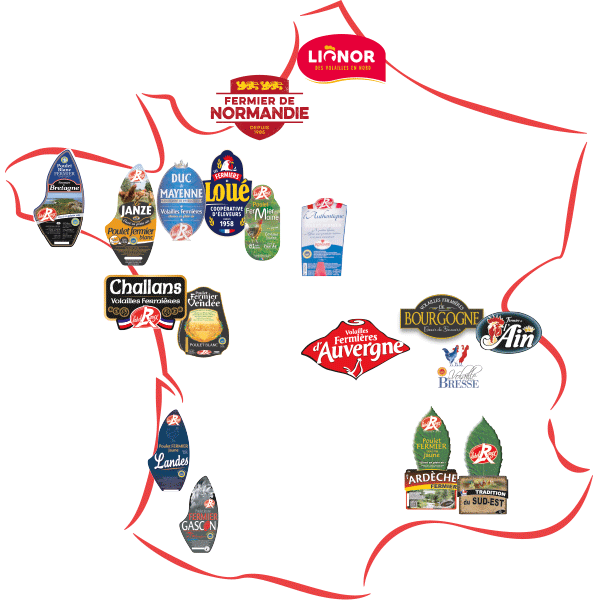
An official quality sign that is specific to France, Label Rouge has been promoting French tradition and know-how since the 1960s. Label Rouge poultry comes from a rustic breed selected for its slow growth and the quality of its flesh. They are reared with access to outdoor areas or using free-range practices for a minimum of 81 days. They only consume 100% plant-based feed, of which at least 70 – 75% is cereals and vegetable proteins. Natural medication is always chosen in preference to other forms.
European regulations provide the framework for the sale of poultry meat via Commission regulation CE 543/2008 of 16 June 2008. To promote French farming traditions, Label Rouge farm poultry is largely identified by an PGI (Protected Geographical Indication), which is registered and protected at a European level.
Whilst it guarantees the consumer with superior quality, Label Rouge certification is never guaranteed for the farmer. Indeed, only a French regional product management organization (ODG) is entitled to apply for a Label Rouge and only the State grants or withdraws the label in case of non-compliance with the specifications. An individual identification number ensures optimum traceability of poultry from hatching to shop.
We benefit from about fifteen French labels across the various regions. To meet the needs of consumers who are increasingly opting for poultry cuts rather than whole poultry, we are investing in our tools to be able to offer ready-to-eat Label Rouge poultry pieces.
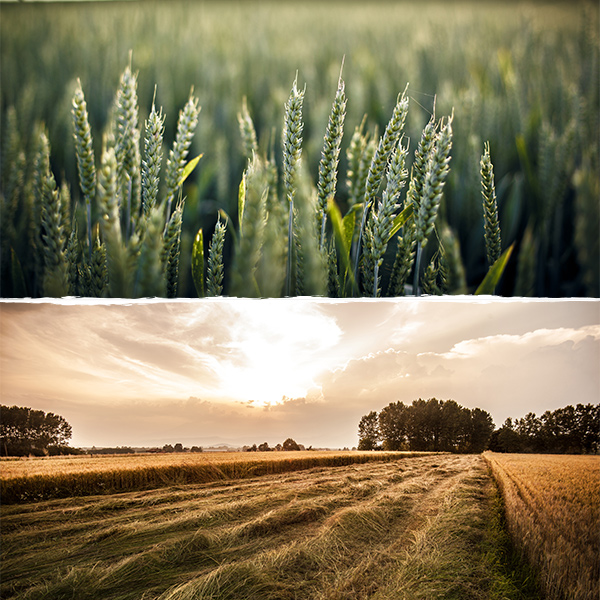
The raw materials used in the composition of animal feed have an impact on the sustainability of subsidiaries and products. They affect:
Poultry feed, which is composed by specialist nutritionists, is produced on manufacturing plants that are located in the heart of farming areas and close to the Group’s preparation plants.
The Group’s own feed plants promote the use of predominantly local raw materials. In addition to the specification association with the official quality signs (organic, label rouge…) which provide a framework for poultry feed, the Group deploys the Nature d’Éleveurs program to ensure that all the producers in question deliver feed to partner farmers that is:
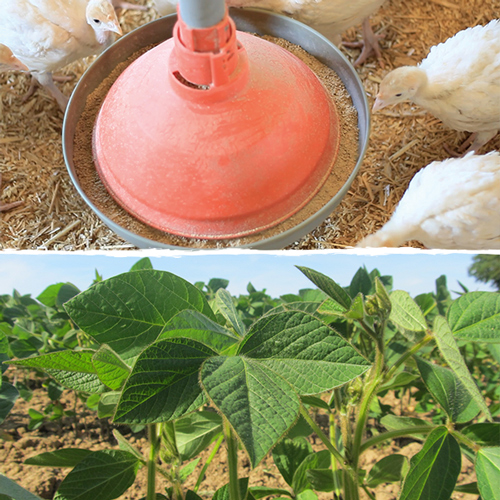
To ensure the quality of raw materials and finished products, partner feed producers in France comply with the OQUALIM control and monitoring plan. The OQUALIM program has been especially developed for animal feed companies and farming sectors and certifies compliance with good hygiene practices and traceability rules in plants and also oversees shared control plans to monitor health risks more effectively. All of these guarantees are ensured with annual audits carried out by independent bodies.
To ensure animals’ protein intake, feed producers also use protein-rich raw materials such as soya, and develop alternatives such as rapeseed, sunflower, pea and faba bean cake etc. To help further promote reliance on the local economy and reduce the carbon footprint of its activities, for the last ten years, the Group has been contributing to the development of a French soya production sector. Initially this was achieved by purchasing French soya beans and cake, but also by supporting the development of the sector within France. Its cereal collection subsidiary, Jeusselin, has also enabled the Group and partner farmers to innovate over the last 5 years by creating a soya subsidiary in Sarthe department, which is based on French seed cultivated in the region.
Although volumes are still limited to cover its needs, the Group is also working with its main suppliers to ensure that, in addition to existing certifications, it has reliable traceability guarantees for the supply of imported soya, in order to control the risk of deforestation in particular. The Group is committed to zero deforestation/conversion and supports the Manifesto for a mobilisation of French players to combat imported deforestation linked to soya. The Group is also a member of the French collective platform DURALIM. An ambitious new regulation was published in the EU’s Official Journal on 9 June 2023, which the Group and its partners will comply with. From the end of 2024, it will prohibit the marketing or export from the European market of products that have contributed to deforestation or forest degradation after 31 December 2020.
Through local production and the preferential purchase of raw materials produced as close as possible to our activities, the Group and its upstream partners increase levels of food self-sufficiency every year. By 2022, 78% of the raw materials used in poultry feed will be local (French in France, Hungarian in Hungary and Polish in Poland).
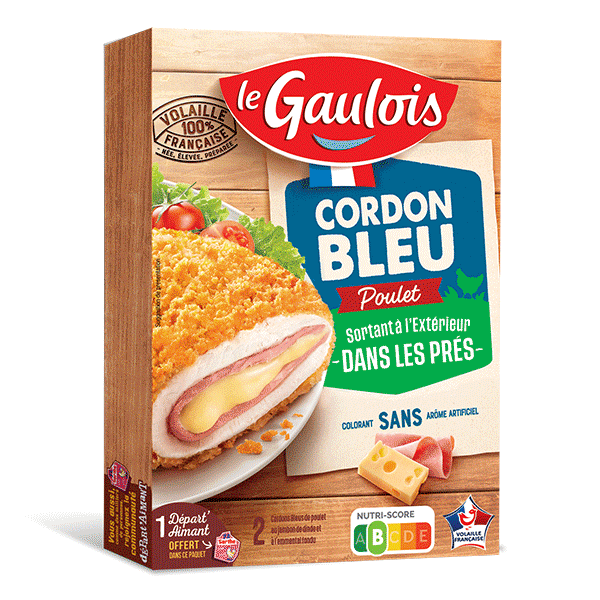
The LDC Group is firmly embedded in our regions and closely connected to the agricultural world and local sectors. The Group has always had a preference for using meat of national origin in its poultry and processed recipes. To achieve this, the Group relies on its network of partners, its labels and regional brands of poultry that are hatched, reared and prepared in each region where we are established. This enables to Group to support and promote the food sovereignty of the countries where it is present. This is also an action that is in the general interests of France, where nearly one chicken out of 2 consumed by the French is imported.
The Group supports the agri-food think tank and in 2019 it signed the “Help consumers to help farmers” manifesto which aims to ensure that consumers are better informed about the origins of the meat in widely-consumed products.
The Group’s founding belief, strong consumer expectations, a guarantee of quality linked to French requirements, good environmental sense, a powerful means of preserving local agricultural sectors… there are many benefits to pursuing this commitment to have meat (poultry, pork or beef) that is 100% of national origin (“born, raised and prepared in the country of origin”) in 100% of its poultry and processed products by 2025 at the latest.
Share of farms committed to an AOP, Organic, Label Rouge, Certification or Nature d’Éleveurs programme
Share of France-sourced poultry feed
Share of meat products containing exclusively local meats
